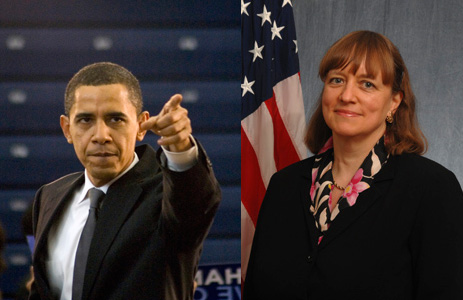Obama To-Do List, May 27, 2010:
- Head of Minerals Management Services: Say good-bye
- Deepwater oil drilling permits: Freeze, six months
- Oil lease sales off Alaska coast: Cancel
- Oil lease sales in Western Gulf: Cancel
- Oil lease sales off coast of Virginia: Cancel
- Safety standards: Get tough
BP beatdown
BP is medicore at plugging leaky oil wells, but has finger-pointing down. The oil giant’s report to Congress suggested crews working for Transocean missed “warning signs” of serious problems under the rig before it exploded, and raised questions about Halliburton’s cement work. But what goes around comes around.
Ian Urbina, writing in the New York Times, reports that just days before the explosion, BP chose to use a cheaper, but riskier casing for the well. And more details have begun spilling out about a heated explosion-day argument on the rig. Transocean reps wanted no part of a plan to replace heavy drilling fluid in the pipe with lighter sea water. A BP “company man” overruled them.
The New Orleans Times Picayune is starting to lay some wood on BP too:
It’s unclear whether the disaster would have been prevented had the drilling mud not been pumped out prematurely, but the blowout would definitely have been less likely. Removing the fluid was BP’s call, and the firm needs to own up to its mistakes.
Greenpeace is soliciting redesigns of BP’s sunny green logo.
ODrama
The next two days will go a long way in determining whether the president gets stuck in BP’s muck. Extending the drilling freeze today and flying to the Gulf tomorrow may rehabilitate his feskless image. And if the “Top Kill” works, he can go all presidential and take control of the cleanup. But he’s still on the high wire.
Here are two takes on his dicey dilemma from a New York Times online debate.
Glenn Greenwald, Salon.com columnist:
Far more significant will be the perception that he (Obama) failed to “protect” us from this threat, a potentially devastating belief in a society where “protecting us from harm” has come to be seen as the president’s overarching responsibility (far higher than what the Constitution actually describes as the prime presidential duty: “to preserve, protect and defend the Constitution”).
Samuel Thernstrom, resident fellow, American Enterprise Institute:
The president must juggle competing concerns: He can correctly point to mounting evidence that both BP and Transocean cut crucial corners in their haste to finish this well, but he cannot succumb to the natural temptation to demonize drilling if he wants to preserve the opportunity for bipartisan climate and energy legislation.
Cry them a river
Finally, Christine Dell’Amore, writing for National Geographic notes a little discussed, self-destructive fallout from the spreading spill: it could end up doing serious damage to the oil industry’s infrastructure in the Gulf.
If oil kills off marsh plants, wetlands will turn to open water, putting the shallowly buried coastal pipelines at risk of ships strikes, storms, and corrosive salt water. Each rip means more leaking oil, costly repairs and replacements, and in some cases, new wetland-restoration projects.


